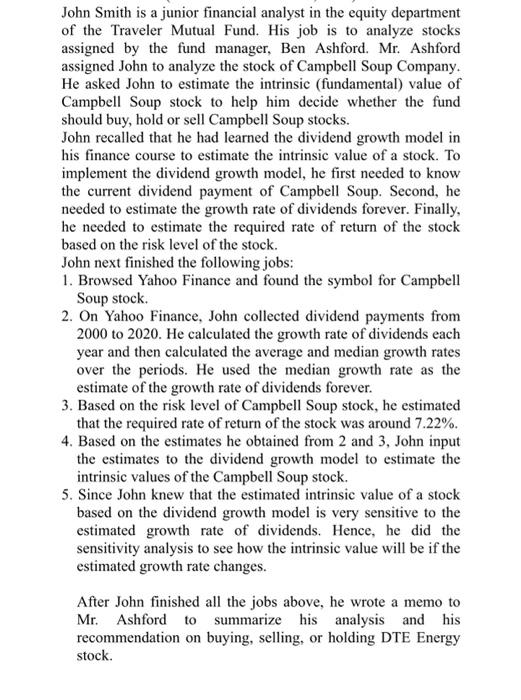John Smith is a junior financial analyst in the equity department of the Traveler Mutual Fund. His job is to analyze stocks assigned by the fund manager, Ben Ashford. Mr. Ashford assigned John to analyze the stock of Campbell Soup Company. He asked John to estimate the intrinsic (fundamental) value of Campbell Soup stock to help him decide whether the fund should buy, hold or sell Campbell Soup stocks. John recalled that he had learned the dividend growth model in his finance course to estimate the intrinsic value of a stock. To implement the dividend growth model, he first needed to know the current dividend payment of Campbell Soup. Second, he needed to estimate the growth rate of dividends forever. Finally, he needed to estimate the required rate of return of the stock based on the risk level of the stock. John next finished the following jobs: 1. Browsed Yahoo Finance and found the symbol for Campbell Soup stock. 2. On Yahoo Finance, John collected dividend payments from 2000 to 2020. He calculated the growth rate of dividends each year and then calculated the average and median growth rates over the periods. He used the median growth rate as the estimate of the growth rate of dividends forever. 3. Based on the risk level of Campbell Soup stock, he estimated that the required rate of return of the stock was around 7.22%. 4. Based on the estimates he obtained from 2 and 3, John input the estimates to the dividend growth model to estimate the intrinsic values of the Campbell Soup stock. 5. Since John knew that the estimated intrinsic value of a stock based on the dividend growth model is very sensitive to the estimated growth rate of dividends. Hence, he did the sensitivity analysis to see how the intrinsic value will be if the estimated growth rate changes. After John finished all the jobs above, he wrote a memo to Mr. Ashford to summarize his analysis and his recommendation on buying, selling, or holding DTE Energy stock. John Smith is a junior financial analyst in the equity department of the Traveler Mutual Fund. His job is to analyze stocks assigned by the fund manager, Ben Ashford. Mr. Ashford assigned John to analyze the stock of Campbell Soup Company. He asked John to estimate the intrinsic (fundamental) value of Campbell Soup stock to help him decide whether the fund should buy, hold or sell Campbell Soup stocks. John recalled that he had learned the dividend growth model in his finance course to estimate the intrinsic value of a stock. To implement the dividend growth model, he first needed to know the current dividend payment of Campbell Soup. Second, he needed to estimate the growth rate of dividends forever. Finally, he needed to estimate the required rate of return of the stock based on the risk level of the stock. John next finished the following jobs: 1. Browsed Yahoo Finance and found the symbol for Campbell Soup stock. 2. On Yahoo Finance, John collected dividend payments from 2000 to 2020. He calculated the growth rate of dividends each year and then calculated the average and median growth rates over the periods. He used the median growth rate as the estimate of the growth rate of dividends forever. 3. Based on the risk level of Campbell Soup stock, he estimated that the required rate of return of the stock was around 7.22%. 4. Based on the estimates he obtained from 2 and 3, John input the estimates to the dividend growth model to estimate the intrinsic values of the Campbell Soup stock. 5. Since John knew that the estimated intrinsic value of a stock based on the dividend growth model is very sensitive to the estimated growth rate of dividends. Hence, he did the sensitivity analysis to see how the intrinsic value will be if the estimated growth rate changes. After John finished all the jobs above, he wrote a memo to Mr. Ashford to summarize his analysis and his recommendation on buying, selling, or holding DTE Energy stock







